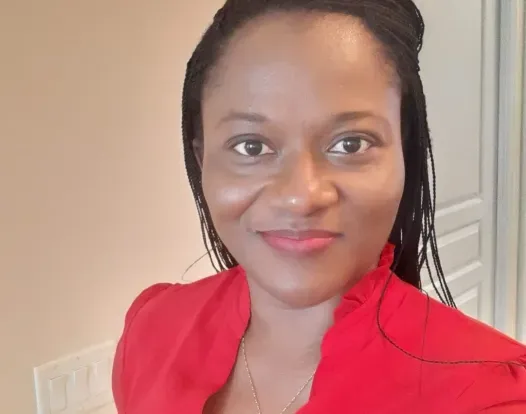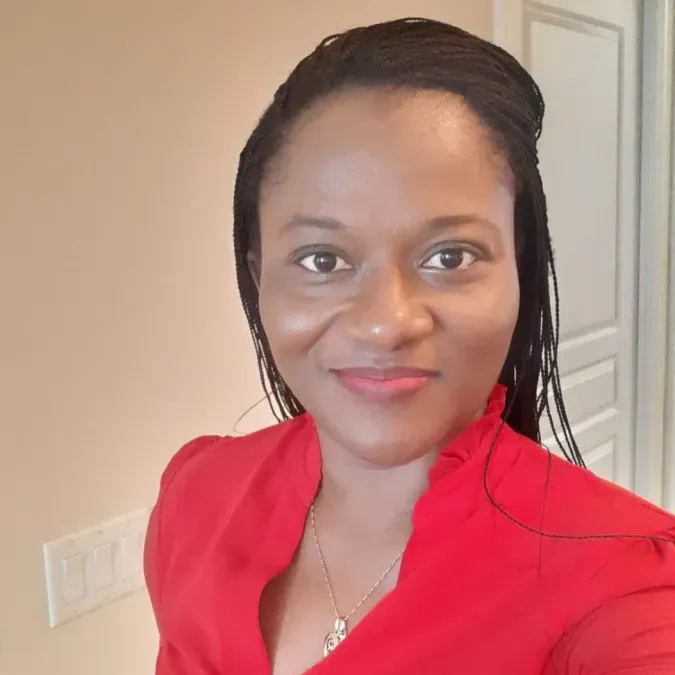These researchers have dedicated their careers to finding new treatments and cures for people with cancer.


In Ghana, cervical cancer is the most common gynecological cancer*, and the second cause of all cancer deaths**. Two-dimensional (2D) radiation therapy (or radiotherapy) was the standard treatment for cervical cancer, but this approach is becoming outdated. The rise of three-dimensional (3D) radiotherapy presents a promising and more effective approach for patients, but access to this treatment advancement in Ghana is limited. Dr. Scott, of the Korle Bu Teaching Hospital, stands ready to help.
Supported by a grant from Conquer Cancer®, the ASCO Foundation, Dr. Scott is working to expand access to 3D radiotherapy for patients in Ghana. Research funding connected her with project mentors and collaborators at Princess Margaret Cancer Centre (PM) in Toronto, Canada, where she learned best practices for bringing 3D radiotherapy back to patients in her home country.
“With cervical cancer still being a major health problem in Ghana, my institution has leveraged the skills and knowledge [I] gained in Canada,” says Dr. Scott. “Together, with the support of my local team and the team at PM, we have designed and implemented modern radiotherapy planning and delivery programs for cervical cancer and other gynecological cancers in Ghana.”
Bringing Care to Patients Back Home
Before designing solutions, Dr. Scott and her mentors examined the factors that contribute to issues patients face with cervical cancer in Ghana. They found that delayed diagnosis, transportation barriers, and limited medical technology were the most common problems.
“We found that only 26% of patients with an evidence-based indication for radiotherapy received treatment, with most patients travelling long distances to access treatment,” says Dr. Scott. “Our findings also showed that Ghana had major national deficits of radiotherapy capacity. There was an enormous need to scale up the availability of radiotherapy [and] improve radiotherapy access.”
To address these gaps in cervical cancer care, Dr. Scott collaborated with colleagues at PM, learning vital 3D radiotherapy techniques for implementation in Ghana. This prepared her to design a treatment program that can replace older radiotherapy approaches with modern and more effective 3D techniques.
“Prior to this, our patients had for several years been treated with simple 2D treatment techniques, so this program was timely as our department had installed the infrastructure needed for migration from 2D to modern 3D treatment techniques. Hopefully, patients treated at my care center in Ghana will have comparable treatment outcomes as their counterparts in more developed nations,” says Dr. Scott. “With our new program, some of our patients are treated with modern advanced [3D] treatment techniques, which are associated with minimal toxicities and better treatment outcomes compared to the old 2D methods.”
Better Scanning Before Treatment
Based on insights from her Conquer Cancer research and collaboration with PM and local mentors, Dr. Scott is including CT scans as part of her home institution’s 3D radiotherapy program. Compared to standard pre-treatment measures like chest-rays and ultrasound, CT scans can provide more detailed information about patients whose disease has multiplied and spread to lymph nodes and other areas of the body. This detection technique helps oncologists more effectively tailor 3D radiotherapy treatment to the unique needs of each patient.
“Furthermore, data gathered show that up to about 70% of our cervical cancer patients have lymph node–positive disease at diagnosis, and this has provided a powerful motivation for including CT scans as a routine component of staging work up in my department,” says Dr. Scott. “My mentors gave me the opportunity to learn about other research methods and strategies aside [from] what my project was about, and this has given me the needed exposure and requisite skills to help build a strong oncological research team in Ghana to find practical solutions that are suitable for our region and globally applicable.”
3D Radiotherapy: Global Reach
Beyond addressing the issues facing patients in Ghana, Dr. Scott’s work has practice-changing implications for gynecological cancer care in neighboring low- and middle-income countries. She’s working to expand the availability of 3D radiotherapy for patients across sub-Saharan Africa.
“This impact is far reaching beyond Ghana because my cancer center also treats patients from many other West African countries such as Sierra Leone, Liberia, and Benin. Oncology residents from Rwanda, Uganda, and Ethiopia receive part of their training at my center in Ghana,” says Dr. Scott. “They will translate the knowledge and skills gained from this program into their practices in their home countries, resulting in improved treatment outcomes in the sub-Saharan African region.”
As Dr. Scott continues bringing modern treatments to her patients, she emphasizes the necessity of donor-funded research and how such support made her project possible.
“Support from Conquer Cancer has really connected me with the resources needed to elevate [my research] onto the global playing field in oncology and contribute to knowledge centered on improving outcomes for patients with cancer,” says Dr. Scott. “It has undoubtedly given me leverage for obtaining future research grants and awards to further improve cancer care and training in Ghana.”
* https://ascopubs.org/doi/10.1200/JGO.2016.005744
** Bray et al., Global Cancer Statistics 2018 DOI: 10.3322/caac.21492




